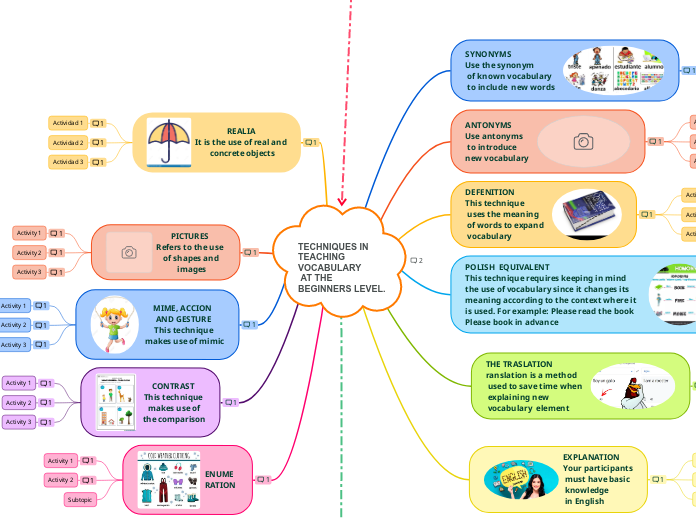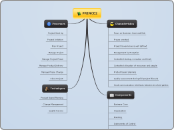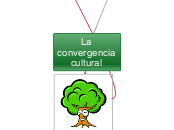Vocabulary Strategies
Inferencing
This means using available information to predict or guess the meanings of; e.g. new vocabulary items. For example, if you know that you are reading about football, and you know that a field is often a large area covered in grass, then you can guess that a football field is a large, grassy area for playing football.
Elaboration
This means relating new information to information you already know. For example, if you know the meaning of 'information', it is easy to remember that the verb is 'to inform', and that 'informative' is an adjective, and that 'an informant' is someone who gives information.
Contextualisation
This means putting new vocabulary words into sentences to help you remember them and to test if you are using them correctly. You can use these sentences when talking to an English-speaker to see if they understand, you can write these sentences in your learner portfolio for the tutors to see, or you can e-mail the tutors and ask them to check these words in your sentences. The most independent ways are talking to an English speaker, and searching the Internet to find examples of the word being used in sentences.
Grouping
you can group words into different areas, such as words in the different courses you study. For example, business students could group vocabulary items into marketing vocabulary, accounting vocabulary, and human resources vocabulary.
Keeping your
own dictionary
vocabulary book: Writing entries for the dictionary will help you to learn words, and using your own dictionary can be faster than a normal dictionary. Click here for more details and examples.
Personalisation
you can write down why the vocabulary item (i.e. the word or phrase) is important to you, where you first saw it, and when you used it, for example, you may have heard the item in a movie you liked (click here for list of movies and famous phrases in them), and used the item when you talked about the movie with your friends.
Translation
You can read a story in a newspaper in your own language first, then read the same story in an English newspaper. Most of the story will probably be the same, so the story in your own language will help you to prepare for reading in English. For example, it will give you vocabulary, and when you read the English story and there is some vocabulary that you don't know, then you can use your knowledge of the story to guess what the new vocabulary is.
Innovative vocabulary teaching techniques at the airport
PICTURES
Refers to the use
of shapes and
images
In this activity, the student must make a magazine cover highlighting the important things that he found in the airport video.
In this activity, students must draw five pictures of each of the characters they identified in the airport video.
In this activity, the student must choose a character from the airport to characterize him play the role that he plays in the airport video.
In this activity the student must list one by one the airlines present in the planes parked at the airport.
In this activity, students must work in pairs and carry out a dialogue between a receptionist and a traveler at the airport, where the receptionist indicates one by one the steps to follow to board the plane.
Hopscotch game:
In this activity, the students in a game of goloza will assign a number to objects, things and people that are present in the airport video.
In this activity, the students must make a word search that includes the different objects present in the video of the airport.
In this activity each student will take an object that is inside the airport to describe it in English to their classmates, each student will have to expose a different object
In this activity, the students will list things and objects that are inside the airport in English and they will present it orally in front of their classmates.
TECHNIQUES IN TEACHING VOCABULARY
AT THE BEGINNERS LEVEL.
Teaching vocabulary at this level is very important element of teaching English, because children,
knowing more and more words, can better communicate with other children.
A simple vocabulary lesson at begi o beginners level might involve the teacher using
techniquesarnersto a short list of new words. If the words are
related to each other in some way ,then the lesson might feel more unified than if the lists contains a more
varied or random selection and is also likely to be easier to remember. This input of new vocabulary
would probably be followed by a practice activity in which the learners could find ways to use the words
that they had just met or revised. Used by the teacher teaching techniques can be different but they must
be fitted to the learner’s knowledge level and should be used,to make the lesson more interesting and
more efficient.
ENUMERATION
This technique helps when any word is difficult to explain visually. We can say
"Clothes" and explain this by listing or listing several items. The teacher may list several garments, for example, one
dress, skirt, pants, etc., and the meaning becomes clear. The same goes for "vegetable" or
"Furniture".
Subtopic
The game of hopscotch
In this activity the students will choose a topic and they will make it known to their classmates and teacher and then jump into the sweet tooth and as they jump and advance in the game they must list the words that are part of the chosen topic. example:
My routine
One I get up, two I make my bed and room, three I bathe, four I have breakfast, five I prepare my lunch box, six I go out to school and so on until I reach heaven.
For this game, the student must speak in English every step of the way.
For this activity, each student will have to make a word soup, for this the teacher will introduce them to the topics on which they should do the word search. Animals, tourist sites, clothing, fruits, food, desserts, parts of the house, types of transport, each student will choose a topic to make their word search that will then be exchanged with other classmates to solve it.
This alphabet soup must be written in English.
CONTRAST
This technique
makes use of
the comparison
This technique makes use of the contrast that usually shows the similarities and differences between people, ideas and things, for example. "The main points of his plan are clear to me, but the details are still confused ”. "But" introduces a clause that contrasts in meaning with the previous one and "nebulous" is opposite to "Sure".
For this activity, the students must draw up on paper a figure or folding shape of either an animal, an object or a thing and within it choose a word, action or situation and that on the left side sponge the similarity of this word and on the right side expose the opposite of this word, so that when you open it you can see the accented word of similarity and difference.
In this activity, each student must make a drawing where they highlight a characteristic of their body or personality and echo one of their classmates who he considers to have that opposite characteristic to give him the drawing.
Roulette activity:
In this activity there will be a roulette that and a candy box on the roulette wheel will be written names of places, objects and things in English and the candy box will be full of folded papers with the option of "similarity" or "difference"; The student should turn the wheel to see what word comes out and then he should take a piece of paper that tells him if he should give a difference or a similarity to the word he got on the wheel.
This activity will take place during English class and all students must participate.
MIME, ACCION
AND GESTURE
This technique
makes use of mimic
This technique is useful for explaining actions and grammar
elements. Concepts such as: jumping, smoking or the words: "from, forward, to", etc. They are easy to explain elements through
perform those actions. Mime, action is a lot of fun for kids who like to act and move.
For this activity the student must choose a color in English and through mimic make his classmates understand so that they can guess what color it is representing.
For this activity, students should work in pairs and after mime they will dramatize a scene of a situation, be it pain, laughter, crying, drama, etc.
The partner who manages to decipher the situation should go to the board and write it in English.
Mimic game:
For this activity there will be a candy box with a word written in English, the students must draw one of the words and through the mime represent it so that their classmates can guess the word
PICTURES
Refers to the use
of shapes and
images
This technique uses "aids" in language teaching, as they are used in different ways.
There are: pictures, blackboard drawings, wall charts, pictures, magazine photos. These "aids" are used to
explain the meaning of words or create a situation and a concept.
The activity tries to take clippings from magazines, newspapers, portraits and make a collage that represents your life project.
What profession would you like to exercise, how would be the style of your house, the car model, the colach must expose at least five aspects of your life plan which you must share orally in front of your colleagues.
In this activity, each student must bring a magazine cover in English and explain in English to their classmates the topic on the cover and what caught their attention on this cover.
Take a family photograph that represents an important moment and share with your classmates who is in that photograph, when it was taken, and why that moment is important.
REALIA
It is the use of real and
concrete objects
This Technique refers to the use of real objects in the classroom. These objects help to make a clear meaning
of the word. (for example, a color, a book, a ball, etc.) The teacher can also use the classroom environment: a
chair, table, board. Things in the classroom that can be "touched", which is important to V. Allen (1983), who
states that learning success depends on the number of senses involved in the learning process and yet
realia is a vital part of introducing vocabulary at the beginning level, where students learn words using concrete objects.
Actividad 3
Activity three: relay race.
In this activity, students must make groups of five people to carry out a relay race that will have five stations and each one must be located in a station for those who are unique in the fifth station will be the one who starts the race must and must carry a object that must be given to his partner from the first station to be delivered and must tell him a characteristic of that object in English for him to memorize, once the first receives the object he must run and deliver the object to the second of the group giving him the characteristic from the first partner and adding another feature for the next partner; At the end of the race, the object must reach the fifth station with five characteristics in English and the student who is at this station who was the first to start must expose the object with the five characteristics in English for the whole class in form veval. path.
The group that finishes the activity first will be the winner.
Actividad 2
Activity two: Relay race.
In this activity, the students must make groups of five people to do a relay race that will have five stations and each one must be located in a station for those who are unique in the fifth station will be the one who starts the race should and must carry with them An object that he must give to his partner from the first station to be delivered and he should tell him a characteristic of that object in English so that he memorizes it, once the first receives the object he must run and deliver the object to the second of the group giving him the characteristic of the first partner and adding another characteristic for the next partner; At the end of the race, the object must reach the fifth station with five characteristics in English and the student who is at this station who was the first to start must expose the object with the five characteristics in English for the whole class in a veval way.
The group that finishes the activity first will be the winner
Actividad 1
In this activity, students must make groups of five people and take a tour of three different places in the school or college and identify five different objects from each place to make a list in English that after the time of the tour should be shared in the classroom, when the teacher indicates it. They should go to the board and write the list of these objects for their classmates to identify the place in the school that each group visited.
To do the tour, all groups have a time of 10 minutes.
EXPLANATION
Your participants
must have basic
knowledge
in English
This is a technique that is assigned to be used with higher beginners, who
already have some knowledge of English. It is essential that the teacher takes into account that when explaining
Certain words must use language, which is understandable to students. In addition, the information
about the frequency of the word should be included.
For this activity, students should bring to class a printed article from a magazine or newspaper in English and should draw out the unknown vocabulary to understand the topic of the article with the help of their teacher.
In this activity, the teacher will make a list of vocabulary not very well known in English for her students and will present them to them in a power-point presentation, highlighting the meaning and use of that vocabulary in English.
For this activity the teacher will give them a song in English for them to listen to, draw the vocabulary they understand and give an idea about the theme of the song to be shared in class.
THE TRASLATION
ranslation is a method
used to save time when
explaining new
vocabulary element
Translation is a method used to save time when explaining new vocabulary element. But, overuse can cause negative effects.
-The slow development of listening skills.
-Fear of the texts, which sense would be comprehensible for the students in spite of unfamiliarity of some words.
For this activity, students must translate a story from English to Spanish and write a moral
For this activity, students must watch the video given by the teacher and translate it.
For this activity, students must listen to the song given by the teacher and translate the chorus of the song.
POLISH EQUIVALENT
This technique requires keeping in mind the use of vocabulary since it changes its meaning according to the context where it is used. For example: Please read the book
Please book in advance
In this method the teacher gives the translation of a word given in the Translation is the most accurate way to demonstrate the meaning of vocabulary items.
However, with frequent exposure to this presentation technique, students may become discouraged from interacting with words, so the teacher must take into account the techniques and words that are best learned if they are introduced in groups (when one word can be associated with another).
Also, the lexical item, as cited above, must be taught in context. The reason is that the meaning of
many words can change, according to their use in particular sentences and in particular
context.
For this activity, students must carry out a dialogue in pairs where they use three homonyms each
For this activity, students must draw ten pictures of homonymous words and write the name to them in English
Acivity 1
For this activity, the students must invent a short story using homonymous words.
DEFENITION
This technique
uses the meaning
of words to expand
vocabulary
Is suitable method for upper-beginners and relies on giving the definition of given word.It
can be simple,unnecesary precise and scientific definition,given by the teacher. It can be the definition from the
dictionary. This is a good method in mobilization of students to the usage of dictionaries
Lottery game
For this, the students will carry out a lottery where each box on the board will contain the meaning of a word and the part of the cover or the card must contain the image that represents that meaning.
For this activity the teacher suggests songs in English to the students and they listen to them and identify the vocabulary so then in class share the theme and the meaning of the lyrics of said song
For this activity the teacher will give the definition of the word and the student who separates the word to which that definition corresponds will let the whole class know.
This is an activity that seeks that all students participate in an exporadic way
ANTONYMS
Use antonyms
to introduce
new vocabulary
In this technique teacher explains the meaning of new word,by giving its opposite, if
students know the word meaning contrary feature e.g. Warm -is not cold. With saying the antonym the gesture
of dent should be combined
Antonyms:
In this activity the teacher will make two lists of words on the board on the left side, he will go through the list of antonyms and one by one the students will pass to join the word with the corresponding antonym with an arrow.
Card game
In this activity, the students must make a game of cards with well-animated illustrations about antonyms to make a game of searching for the antonym's partner.
In this activity the students must work in pairs, for this they will choose an action where one represents the action and the other the antonym of that action.
the classmate who first describes the action and his antonym must express it in English in front of the class to reach the insentive.
SYNONYMS
Use the synonym
of known vocabulary
to include new words
This technique is based on explaining the meaning of a new word by giving another word, which
students know and understand, and what it means almost the same. For example: Huge-large, skinny-slim etc.
Activity 3
For this activity, students must invent and write a verse with four synonyms, to be said in class
Activity 2
With a partner they should represent an action or a situation with its respective synonym to be dramatized in front of their partners and they should guess the situation they are representing.
For this, there will be a bonbonera where the papers will be with the themes that each couple must represent.
Activity 1
In this activity, the students must cut out images of objects, places or things with their respective images that represent the synonim for each case, paste them in the notebook and under each image place the name.









